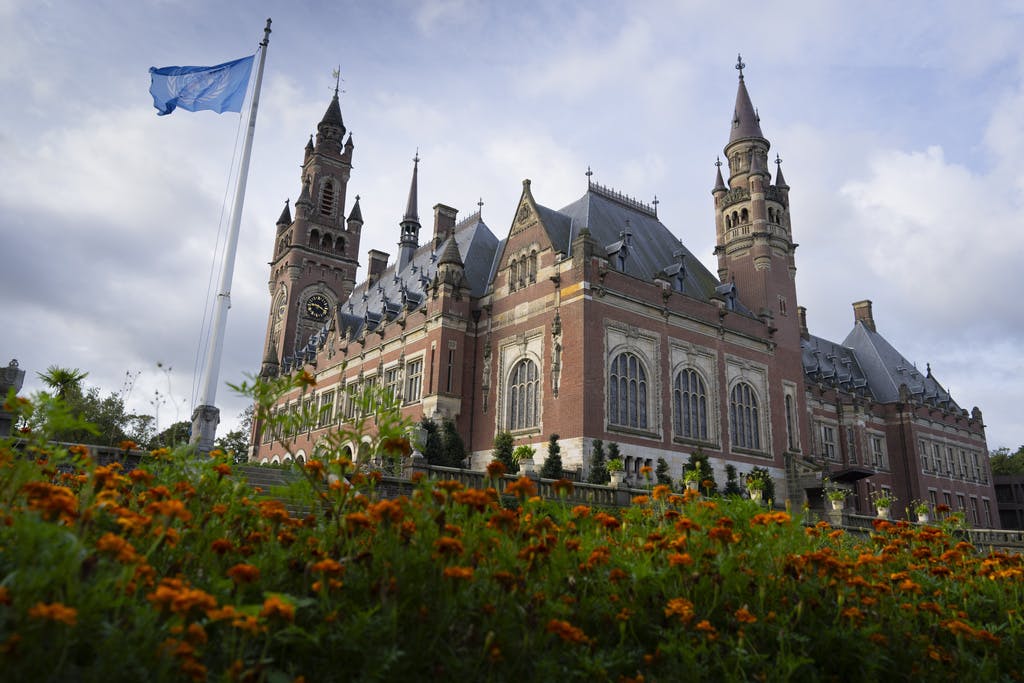With Decision Due at the Hague on Pretoria’s Genocide Accusation, Israelis Are Cautiously Optimistic
The UN’s top judicial organ is expected to address a petition to order Israel to stop its military operation in Gaza. Among South Africa’s demands is even a call on Israel to reconstruct civilian buildings it has destroyed in the course of the war.

Israelis are cautiously optimistic on the eve of a decision at the Hague regarding South Africa’s accusation that Jerusalem is committing genocide in Gaza. If the decision turns out to be adversarial, it could complicate Israel’s efforts to eradicate Hamas, the genocidal terrorist group that launched the Gaza war October 7.
The International Court of Justice — the top judicial organ of the United Nations — is expected to issue a preliminary decision Friday on South Africa’s accusation. Adjudicating the question could take years.
Most pressing, the court on Friday is expected to address Pretoria’s petition to order Israel to stop its military operation in Gaza. Among South Africa’s demands for an emergency ruling is even a call on Israel to reconstruct civilian buildings it has destroyed in the course of the war.
“I think the ICJ’s decision will be somewhat parve,” a former legal adviser for Israel’s foreign ministry, Alan Baker, tells the Sun, referring to the Jewish term for kosher food that is neither meat nor dairy. “They are unlikely to completely forgo a decision. Instead they could call on Israel to lower the number of casualties and amp up humanitarian deliveries.”
Israel could live with such a decision, as it contends it already is doing its utmost to minimize civilian casualties. It also delivers more aid to Gaza than is approved of by the Israeli public. Family members of hostages held by Hamas blocked the Kerem Shalom crossing into the strip Thursday.
The protesters are angry that Israel is facilitating deliveries of food, medicine, and other goods for the people of Gaza even as Hamas-held abductees go hungry. An agreement was recently made under French auspices to allow the Red Cross to deliver medications to hostages that need them. As of yet, Israel has received no proof that the medicine reached any of the hostages.
Israeli officials are expressing confidence in the case their judicial team made at the Hague against what they see as South Africa’s “abuse” of the convention against genocide.
“We expect the ICJ to throw out these spurious and specious charges,” a government representative, Eylon Levy, told reporters Thursday. Yet, Israel sent to the Hague a top legal team, including several lawyers who have long been out of government, indicating its concerns about the case.
One reason is the strong link between the genocide convention Israel is accused of violating and the attempt to annihilate the Jewish people. Israel cites the Hamas charter, containing statements such as, “Israel will exist and will continue to exist until Islam will obliterate it,” as proof that only its enemy harbors genocidal goals.
“We can only hope that somewhere in the ICJ opinion, there will be a reference to the fact that South Africa failed to establish the argument that Israel intends to commit genocide,” Mr. Baker, who is now with the Jerusalem Center for Public Affairs, says.
The Israeli team at the Hague argued that beyond its flimsy case for genocidal intent, South Africa even failed to follow ICJ proceedings. The court was built as a last-resort venue for settling disputes between UN member states. Israel noted that Pretoria’s December filing preceded an attempt to negotiate with Jerusalem.
Israel requested in writing a meeting to discuss the allegation. As Israeli lawyers made clear at the Hague, Pretoria at first said a meeting date was unsuitable because of a holiday, and then replied there was “no point” in discussing the issue with Israel.
On the face of it, South Africa’s legal case is weak, and was further weakened by the Israeli legal team’s performance, Jerusalem officials say. By issuing an emergency call to stop the war, the judges would need to adopt Pretoria’s premise that genocidal intent exists.
Despite provisions in the UN Charter that render the ICJ a legitimate judicial venue, it is essentially a political body. Among the court’s current 15 judges are members from countries with weak judicial traditions that are also adversarial to or have cool relations with Israel, including but not limited to Russia, Communist China, Lebanon, and Morocco.
Even a French judge, Ronny Abraham, who is Jewish, is said by diplomats to be a longtime critic of anything having to do with Israel. The ICJ’s politics align with other world bodies, often leaving Israel feeling isolated.
“No one will stop us, not the Hague, not the axis of evil and no one else,” Prime Minister Netanyahu said recently. Yet, if an ICJ writ is issued to stop the war, the matter will quickly come to the UN Security Council, which has enforcement tools that the Hague lacks.
While America to date has opposed an immediate cease-fire, the Biden administration’s affinity with the UN could prevent it from vetoing a resolution based on an ICJ ruling; instead, it could try to soften a proposed council resolution. Israeli officials are confident that Washington would maintain its policy, and are even skeptical that the ICJ would order an end to war.
Yet, the ICJ is an organ of a body that Israelis now trust even less than in the past. “The beginning and the end of the ICJ case is that it is the UN,” Mr. Baker said.

